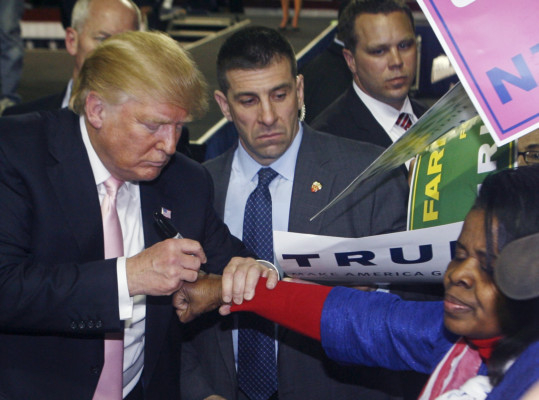
The question Republicans ought to be asking themselves right now is: Why, exactly, does the prospect of Donald Trump as the party’s nominee — perhaps even as president — scare you?
Is it because he might be a closet moderate — perhaps even a liberal? Because in the past he has donated money to Democratic politicians (he explains this away as, essentially, influence buying — exactly the sort of money-driven politics he now claims to be running against)? Is it because he claims to oppose Obamacare but also says that people should not be allowed simply to “die in the streets”? Is it because he favours higher taxes on hedge fund managers?
Or are you against Trump because he is a xenophobic bigot? A demagogue with a volatile temper who mistakes bullying for strength. Someone unworthy to lead the party of Abraham Lincoln, Theodore Roosevelt, Dwight Eisenhower and Ronald Reagan. Someone who no sane person would put in charge of America’s military and its nuclear arsenal?
The Republican Party ought to be focused on the latter, but often seems far more concerned about the former. This is a big reason why it seems increasingly possible that the party will wind up being led by the real-estate-magnate-turned-reality-TV star. As this column goes to press voting is taking place across a dozen US states in the mega-primary known as ‘Super Tuesday’. It is conceivable that when the votes are counted Trump will have put together a near-insurmountable lead in the race for the GOP nomination.
There is clearly a realisation within the Republican Party that down this road, the potential for disaster lies. Last week, Senator Lindsay Graham of South Carolina told an audience that “my party has gone bat**** crazy”. Yet, it is only in the last few days that rivals such as Senators Marco Rubio and Ted Cruz have begun to attack Trump’s character (Rubio has taken to calling him a “con man”), question his fitness for office and challenge the self-aggrandising narrative Trump spins around himself.
Until recently, the biggest establishment Republican complaint about Trump was not that his rhetoric is divisive and occasionally violent, but that his conservatism is feigned: That he talks like a conservative (most of the time) but cannot be counted on to govern as one. On one level this is surprising. Taken at face value, Trump’s ideology, for the most part, sits squarely in what passes for today’s GOP mainstream. He supports large tax cuts that (hedge fund managers aside) would favour the rich, wants to use the US military more often and more aggressively, especially in the Middle East; unapologetically embraces the use of torture and promises never to close the prison at Guantanamo Bay. Even Trump’s signature policy: Deporting the roughly 12 million people residing in America illegally and building a massive wall along the US-Mexico border is embraced, albeit somewhat less bombastically, by all but one of his remaining Republican rivals (Ohio Governor John Kasich rightly points out that the deportation plan is both cruel and not realistically possible).
The party is now caught between belatedly figuring out whether there is any way Trump can be stopped, and debating whether it can rationalise its way to accepting Trump as the GOP standard-bearer.
The first faction was explored at length by the New York Times last week. According to the newspaper, Republican leaders are panicked behind the scenes and Senate Majority Leader Mitch McConnell has been telling colleagues they should feel free to drop Trump “like a hot rock” and run ads against him in the fall if it seems like the best way to save their seats.
Yet, a counter-wave is also clearly taking shape. In the last week, Trump has picked up his first endorsements from the political mainstream: Two House members, two Governors (including Chris Christie of New Jersey, a rival candidate for the nomination until a few weeks ago) and a US Senator. A faction — and, make no mistake, it is likely to be a significant faction — among Republicans is clearly coming to the conclusion that it can live with Trump not just from now until November but potentially for four years beyond that.
The question these Republicans need to be asking themselves is what sort of long-term damage they risk doing to their party. Since the late 1960s, the GOP has been the party of white grievance, but it has never, on a national level at least, embraced the sort of overt bigotry around which Trump has built his campaign.
Even the argument that Trump is a showman and egomaniac with no real core beliefs beyond a desperate desire for the spotlight should hold no comfort for serious Republicans. Some GOP figures are already trying to make their peace with the Trump phenomenon by telling themselves that all Trump really cares about is ‘winning’ — implying that he would govern more moderately than he has campaigned, partly because the election would be over, partly because he has a core of human decency and, perhaps most importantly, because once in office, his ‘I’m-a-winner’ ethos would require that he cut deals with all and sundry so that he can demonstrate that he is ‘winning’ — and getting things done.
Even if one buys that highly dubious argument, it avoids the fundamental question: In the long run, will anything recognisable remain of a Republican Party that allows itself, even for a few months, to be led by Donald Trump?
Gordon Robison, a longtime Middle East journalist and US political analyst, teaches Political Science at the University of Vermont.









